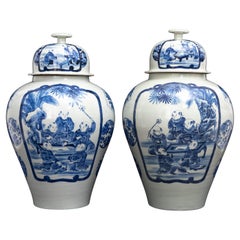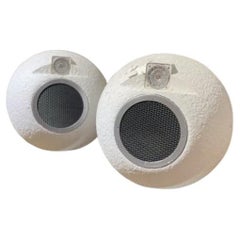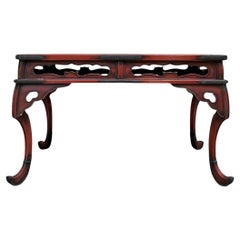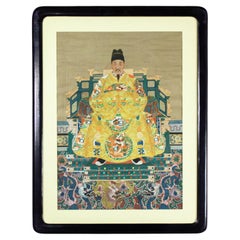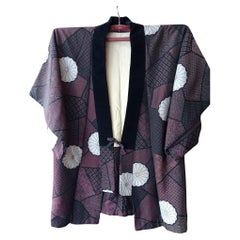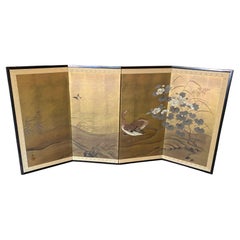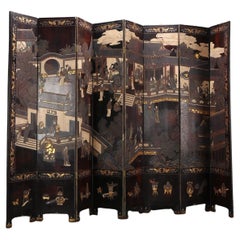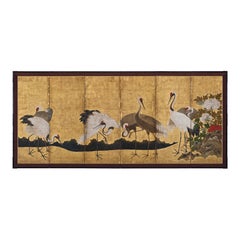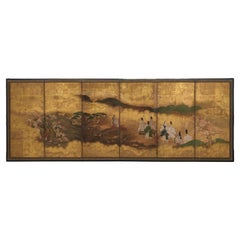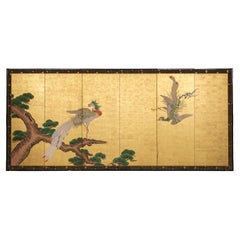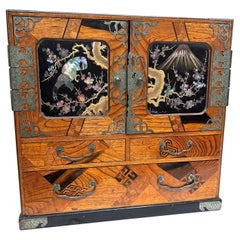Asian Art and Furniture
20th Century Japanese Showa Asian Art and Furniture
Gold Leaf
Late 19th Century Chinese Qing Antique Asian Art and Furniture
Lacquer
Mid-17th Century Japanese Edo Antique Asian Art and Furniture
Gold Leaf
17th Century Japanese Antique Asian Art and Furniture
Metal, Gold Leaf
Early 19th Century Japanese Antique Asian Art and Furniture
Metal, Gold Leaf
Late 19th Century Japanese Meiji Antique Asian Art and Furniture
Wood, Mother-of-Pearl, Lacquer
Early 20th Century Japanese Meiji Asian Art and Furniture
Textile, Wood
Early 20th Century Japanese Meiji Asian Art and Furniture
Gold Leaf
1910s Japanese Showa Vintage Asian Art and Furniture
Iron
Mid-20th Century Japanese Showa Asian Art and Furniture
Silver Leaf
20th Century Japanese Showa Asian Art and Furniture
Earthenware, Pottery
Early 20th Century Japanese Taisho Asian Art and Furniture
Gold Leaf
20th Century Chinese Chinese Export Asian Art and Furniture
Wood, Lacquer
Late 19th Century Japanese Meiji Antique Asian Art and Furniture
Wood
Mid-20th Century Thai Mid-Century Modern Asian Art and Furniture
Teak
Early 20th Century Chinese Qing Asian Art and Furniture
Brass
Late 19th Century Japanese Meiji Antique Asian Art and Furniture
Bronze
Early 20th Century Chinese Qing Asian Art and Furniture
Copper
Early 20th Century Japanese Taisho Asian Art and Furniture
Stone
Early 20th Century Indonesian Asian Art and Furniture
Wood
20th Century Japanese Showa Asian Art and Furniture
Gold Leaf
Early 20th Century Japanese Other Asian Art and Furniture
Paint, Paper
Early 20th Century Japanese Asian Art and Furniture
Enamel, Metal
1960s Japanese Mid-Century Modern Vintage Asian Art and Furniture
Iron
1980s Chinese Chinese Export Vintage Asian Art and Furniture
Pottery
Late 19th Century Japanese Anglo-Japanese Antique Asian Art and Furniture
Porcelain
20th Century Japanese Meiji Asian Art and Furniture
Wood, Walnut
Late 20th Century Japanese Showa Asian Art and Furniture
Cedar
19th Century Javanese Antique Asian Art and Furniture
Ceramic
Early 20th Century Japanese Meiji Asian Art and Furniture
Chestnut
20th Century Japanese Taisho Asian Art and Furniture
Wood
20th Century Japanese Showa Asian Art and Furniture
Gold Leaf
Early 20th Century Japanese Anglo-Japanese Asian Art and Furniture
Silk
19th Century Japanese Antique Asian Art and Furniture
Ceramic, Porcelain
Late 19th Century Chinese Qing Antique Asian Art and Furniture
Elm, Reed
Late 19th Century Japanese Edo Antique Asian Art and Furniture
Cedar
Early 20th Century Chinese Archaistic Asian Art and Furniture
Bronze
19th Century Chinese Qing Antique Asian Art and Furniture
Brass
15th Century and Earlier Cambodian Antique Asian Art and Furniture
Bronze
19th Century Antique Asian Art and Furniture
Silk
Late 19th Century Japanese Primitive Antique Asian Art and Furniture
Wood
Mid-19th Century Indian Antique Asian Art and Furniture
Paper
Early 20th Century Japanese Meiji Asian Art and Furniture
Copper
Early 20th Century Japanese Taisho Asian Art and Furniture
Iron
Early 20th Century Chinese Qing Asian Art and Furniture
Brass
19th Century Japanese Antique Asian Art and Furniture
Enamel
17th Century Unknown Antique Asian Art and Furniture
Textile
Mid-20th Century Japanese Asian Art and Furniture
Porcelain
Late 20th Century North Korean Minimalist Asian Art and Furniture
Stoneware
19th Century Japanese Antique Asian Art and Furniture
Enamel
Early 20th Century Japanese Taisho Asian Art and Furniture
Iron
1980s French Mid-Century Modern Vintage Asian Art and Furniture
Wood
1960s Vintage Asian Art and Furniture
Bamboo, Paint, Paper
2010s Argentine Other Asian Art and Furniture
Cotton
Early 1900s Japanese Meiji Antique Asian Art and Furniture
Metal, Iron
20th Century Japanese Showa Asian Art and Furniture
Silk, Wood, Paper
18th Century Japanese Edo Antique Asian Art and Furniture
Gold Leaf
Early 1900s Japanese Meiji Antique Asian Art and Furniture
Cedar, Lacquer
17th Century Unknown Antique Asian Art and Furniture
Textile
Mid-20th Century Asian Chinoiserie Asian Art and Furniture
Wood, Padouk
Antique and Vintage Asian Art and Furniture
From Japanese handmade earthenware pottery, originating circa 14,500 B.C. and adorned with elaborate corded patterns known as jōmon, to natural elm case pieces and storage cabinets built in Qing dynasty–era China to mid-century Thai rice-paper charcoal rubbings, antique and vintage Asian art and furniture make for wonderful additions to all kinds of contemporary interiors.
Eastern elements elevate any home’s decor. Introduce zen sensibility to your living room, dining room and bedroom with the neutral color palettes and the natural materials such as rattan, bamboo and elm that we typically associate with traditional Asian furniture. Decorative handwoven embroideries and textiles originating from India and elsewhere on the continent, which can be draped over a bed or sofa or used as a wall hanging, can be as practical as they are functional, just as you wouldn’t seek out Japanese room-divider screens — often decorated with paintings but constructed to be lightweight and mobile — merely for privacy.
With everything from blanket chests to lighting fixtures to sculptures and carvings, it’s easy to tastefully bring serenity to your living space by looking to the treasures for which the East has long been known.
For British-born furniture designer Andrianna Shamaris, the Japanese concept of beauty in imperfection isn’t limited to her Wabi Sabi collection. She embraces it in her New York City apartment as well. In the living area, for instance, she retained the fireplace’s original black marble while swathing its frame and the rest of the room in bright white.
“We left the fireplace very clean and wabi-sabi, so that it blended into the wall,” says Shamaris, who further appointed the space with a hand-carved antique daybed whose plush pillows are upholstered in antique textiles from the Indonesian island of Sumba.
In the growing antique and vintage Asian art and furniture collection on 1stDibs, find ceramics from China, antiquities from Cambodia and a vast range of tables, seating, dining chairs and other items from Japan, India and other countries.
Read More
Symbols of Happiness and Rebirth Adorn This Japanese Satsuma Bowl
Decorated with white cranes and the sought-after thousand-butterflies motif, the Meiji-period vessel offers both a celebration of traditional aesthetics and a clear reflection of the era’s appetite for exquisite export pieces.
Chicago’s Pagoda Red Has a Spirited Mix of Asian Antiques and Bold New Art
For 25 years, gallerist Betsy Nathan has leveraged her keen eye and key connections to bring a unique selection of rare finds to the market.
In L.A., Gallerist JF Chen Has Long Championed Eclectic Blue-Chip Design
Now working alongside his daughter Bianca, dealer Joel Chen has presented a most covetable array of antiques, art and contemporary creations for more than 40 years.
12 Calming Spaces Inspired by Japanese Design
From cherry-blossom-adorned walls paired with glamorous lighting to wood-paneled ceilings above checkerboard-patterned chairs, these 12 spaces seamlessly blend Eastern and Western aesthetics.
Rodrigo Rivero Lake’s Mexico City Showroom Is a Museum-Worthy Trove of Spanish Colonial and Asian Antiques
The dealer and curator has spent the past 50 years amassing a collection of exceptional art, furniture and architectural elements that trace the cultural influence of the Spanish empire from Europe to the Americas and beyond.
16 Refined Asian-Inspired Interiors
These spaces exemplify how Eastern elements elevate a home's decor.
